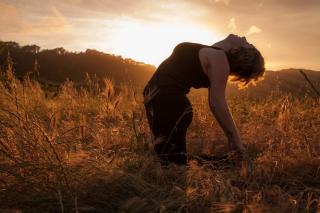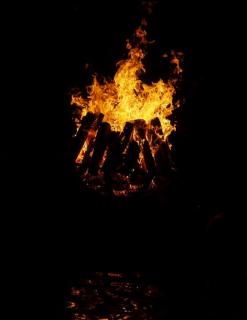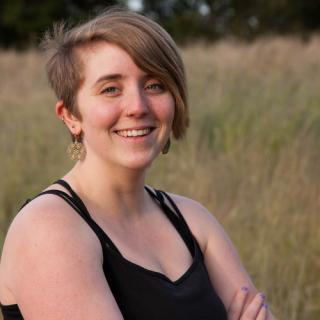Fiercely UU: Redefining Bravery
By Annie Gonzalez Milliken
Fiercely UU is a blog series where Unitarian Universalist (UU) young adults tell stories about what our faith requires of us and how they follow that call. To be fiercely UU is to proclaim human worth and interdependence. In an individualist, greed-based, shame and fear fueled white supremacist patriarchy, we say no to isolation and oppression and yes to radical love and covenanted connection. – ed.
Redefining Bravery
by Em Kianka
I’ve always been hard on myself about being brave. When push comes to shove, I generally avoid conflict, or “risky” situations, or I become passive. Public speaking, at least in the past, has been a completely draining exercise that I need an entire weekend from which to recover. When, in the wake of the non-indictment of Darren Wilson, Michael Brown’s killer, I was out in the streets, I stood, rooted to the spot, as I watched friends, colleagues, and strangers pour onto the freeway. When my body enters into the state most often referred to as fight, flight, or freeze, I am a freezer. And I have always, from the bottom of my heart, wanted to call myself a fighter.
Bravery is an important value in Unitarian Universalist (UU) circles. We care deeply about social justice, and we aim to grow communities that will be courageous and resilient in the face of systems of oppression and systemic injustices. Arguably, given our theological diversity, our bent towards fighting for social justice epitomizes much of our cohesion. We may not share the same beliefs about God, but we do abide on the side of love together. And we are called, as a denomination, to do our individual and collective part as people of faith to help dismantle institutional racism. Uprooting systemic racism takes, among other things, continual, practiced, consistent courage—the courage to challenge and confront institutions, question the status quo, and—speaking for myself, as a white person—having difficult and fraught conversations about race and racism with other white people. For a non-confrontational person like me, aiming to be an ally in the movement means facing my discomfort with confrontation and conflict, as well as the negative things I have to say to myself about my so-called lack of courage.
I am habitually grateful that my religious values help keep me accountable. I feel called to be fierce, to not look away from the injustices of the world, and to do my part to fight against them. And, simultaneously, I have very negative things to say to myself about all the ways in which I “fail” to answer this call. Some of them need to be heard—they remind me that passivity and inaction all contribute to the stasis of the very systems that dehumanize, marginalize, and commit atrocious injustices against people. And some of the things I have to say to myself are downright mean—they are things I would never, ever say to a friend.
The third principle of Unitarian Universalism is the “Acceptance of one another and encouragement to spiritual growth in our congregations.” Like the other principles, accepting one another and encouraging each other to spiritual growth is way easier said than done. When I tell myself that I’m not brave, that I’m fearful and overly-sensitive, and when I compare myself to other (brave) people, and say to myself I am nothing like them, that I can’t be the person, the fighter, I so desperately want to be, am I encouraging myself to my own spiritual growth? Am I truly seeing and accepting myself? Or am I making myself and my bravery invisible?
Being courageous means living life according to your heart, not necessarily running out onto the freeway, although that’s most certainly a brave thing to do. I live my life in a heart-centered way; I have taken meaningful risks, and pushed past a lot of fear. I came out as queer as a teenager (fortunately, I lived in a community in which it was safe for me to do so). I heeded a call to ministry, and started seminary. Most recently, I’ve been growing into a new sense of identity as a healer, and I am working on becoming a healing arts practitioner for survivors of sexual violence, teaching trauma-informed yoga. All of these things have taken varied amounts of continual courage—the slow and steady kind.
Imposter syndrome is a pervasive belief in your own inadequacy despite all evidence to the contrary. Individuals who believe fervently in their own inadequacy are often plagued by self-doubt, lack of confidence, and have significant difficulty recognizing and internalizing their intrinsic self-worth. Imposter syndrome has always resonated with me. I’ve lived so much of my life waiting to be found out as a “fraud”; sure that soon, at any moment, my friends and colleagues will realize that I’m an inadequate UU, or a bad friend, or an unqualified yoga teacher, even though I have no evidence that substantiates any of those beliefs. There are, of course, things I’m working on in those areas of my life—but everyone has growing edges, and they don’t make you a fraud. Rather, they are what make you real.
I believe that my imposter syndrome—perhaps like many others—is the result of my socialization in a society that conditions people who identify as female to please others, combined with the way in which our capitalist culture emphasizes results, perfection, and constant achievement. For me, practicing the 3rd principle of Unitarian Universalism towards myself—which means truly accepting my brave, fierce, and authentic self—is turning to one of the most radical aspects of Unitarian Universalism: the 1st principle, “the inherent worth and dignity of every person.” Our Universalist heritage tells us that we don’t need to do more to be loved by God—we are already loved. As a theist, God’s love for me teaches me how to believe in my own intrinsic self-worth. In this way, my Unitarian Universalist faith continually shows me the way out of the eeriness of my self-doubt, my conjured sense of inadequacy, back to the path of love. Once I feel myself grounded in this foundation—a foundation of love, rooted in my faith—then I can begin to work through my conflict avoidance, knowing I owe it to more than just myself to work through my discomfort with confrontation, but I can do it gently, with tenderness and care towards myself. In all this work, it’s my Unitarian Universalist faith that keeps me grounded and able to answer a call to seminary, to be a fierce healer and hold space for others, to challenge my own conflict avoidance, and to courageously live life from my heart.
Em is a seminarian at Starr King School for the Ministry, pursuing ordination through the Unitarian Universalist Association. She is also a yoga teacher, and is passionate about teaching yoga to survivors of trauma. You can learn more about trauma-informed yoga and Em on her website. Em lives in Berkeley, California with her partner and their cat, and in her spare time enjoys reading novels and baking.




